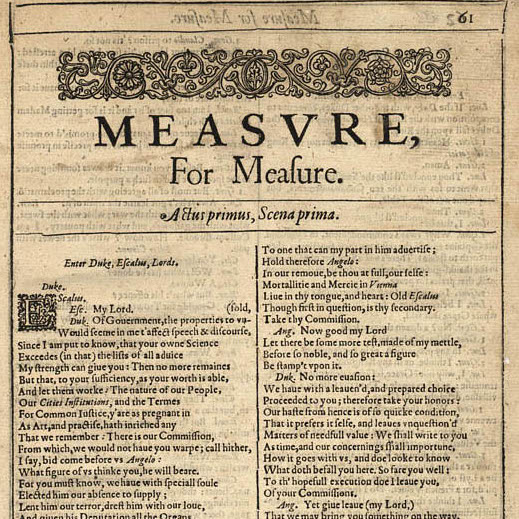Vol. 75, No. 3
pp. 156-217, 2021
Articles
-
Thomas Middleton's Absent Stanza: Musical Transplantation and the Textual Lacunae of William Shakespeare's Measure for Measure
William David Green
This article begins by considering how our knowledge of play-revision in early modern England can help us to understand why a company might have elected to alter a play so substantially in anticipation of a theatrical revival almost two decades after the play’s initial performance. Having established how this theatrical practice was one made use of when reviving many plays from this period of theatre history, I then turn to interpreting how our understanding of the conditions of revival, specifically the nature of the playhouse itself, would have served to optimise the effectiveness of this musical interpretation. Finally, I argue that particular attention should be paid to the boy player who performed this song, suggesting that this performance is effect in the theatre largely because it would have encouraged the audience to recall the King’s Men’s wider theatrical repertory, the boy thus exploiting the idea of absent musical material to force into some spectators’ minds the presence of other recently-staged works.
-
"Damage to Trees": Performing Alan Ramsay's The Gentle Shepherd at Haddington's Grammar School
Brianna Robertson-Kirkland
Under specific consideration in this article is whether the Haddington Grammar schoolboys gave the performance at Tailors’ Hall in January 1729 and which version of The Gentle Shepherd was performed at Haddington in August 1729. To address these questions, one must first re-examine the prologues and epilogues spoken at these performances.
-
Institutional Legacies: Building Histories from the Footnotes and the Margins
Sarah Jane Mullan
In this article I outline how the Drill Hall’s enduring association with LGBT performance has persisted, subsequently inscribing a cultural understanding of the site as an LGBT institution. Drawing on the reflections of the venue’s only Artistic Director Julie Parker and internal review documents I illuminate why such labelling of the theatre is insufficient, namely in occluding its other distinct aspects and by flattening out debates surrounding what the venue ‘was’ that persisted throughout its existence. Given this central tension, I suggest that Drill Hall is better understood as a queer institution, in order to more fully capture its broad practices, continued support of LGBT arts and refusal to be defined. In so doing, I expand understandings of this partially documented site and illuminate the need to critically consider how venues got documented, particularly to avoid creating and affirming an institutional identity that may be reductive.
-
Neoliberal (Dis)posession in Rose Lewenstein's Cougar
Alex Watson
Here, I will be exploring Chelsea Walker’s production of Rose Lewenstein’s Cougar at the Orange Tree Theatre in Richmond, London (2019), as it looks to depict one such hyperobject–neoliberalism–through this absent-present interconnectivity. Furthermore, I will demonstrate how the play articulates this interconnection as a force that both possesses individuals with the hyperobject of neoliberalism, while somewhat dispossessing them of autonomy and transgression. This analysis of Cougar follows some introductory historical, materialist, and thematic context: namely, the effects of neoliberalism ion UK theatre and the Orange Tree more specifically, the lineage of anti-neoliberalist playwrighting, and the concepts of theatrical felt absences and neoliberal dispossession.
BOOK REVIEWS
Their Exits: Encore, by Henry Vivian-Neal and Alexander Bisset
reviewed by David Coates
Special issue on “Absence”, curated by the New Researchers Network ***
Thomas Middleton’s Absent Stanza: Musical Transplantation and the Textual Lacunae of William Shakespeare’s Measure for Measure *** “Damage to Trees”: Performing Alan Ramsay’s The Gentle Shepherd at Haddington’s Grammar School *** Institutional Legacies: Building Histories from the Footnotes and the Margins *** Neoliberal (Dis)posession in Rose Lewenstein’s Cougar
